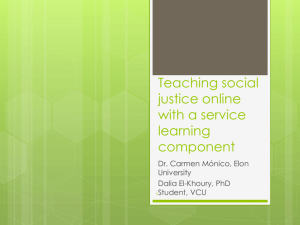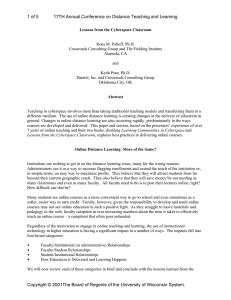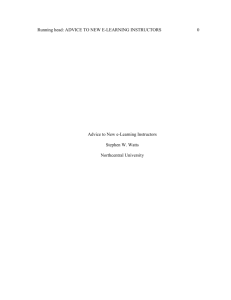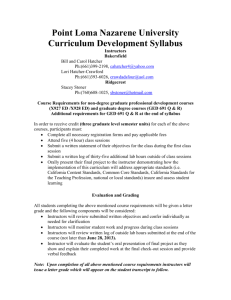2-page proposal file
advertisement
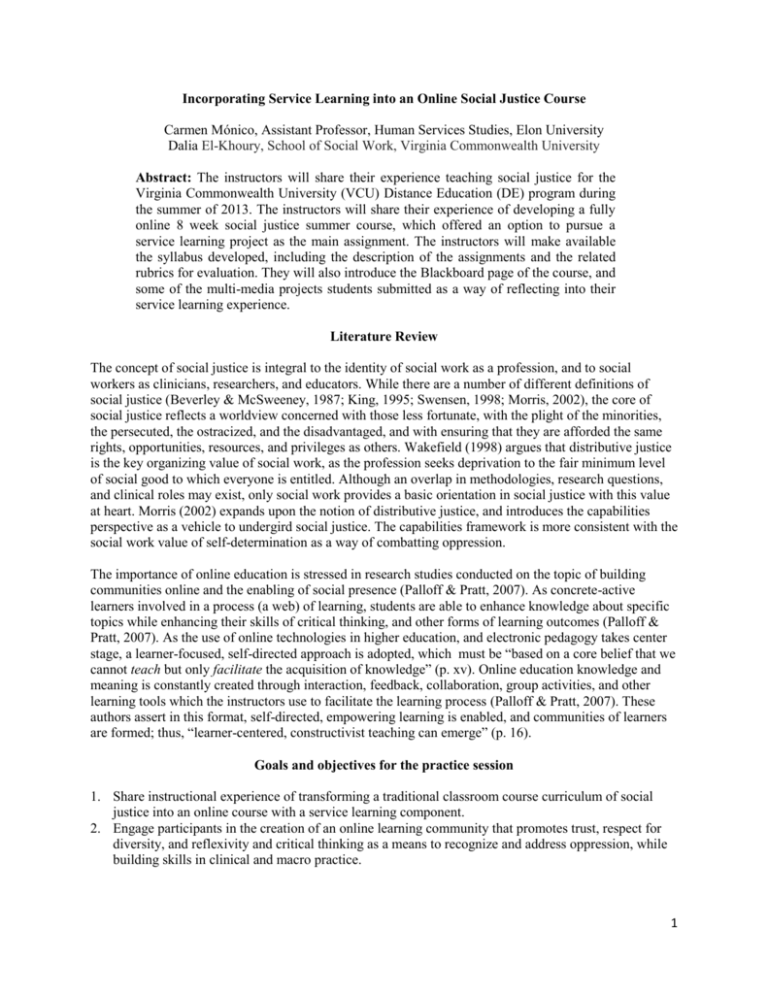
Incorporating Service Learning into an Online Social Justice Course Carmen Mónico, Assistant Professor, Human Services Studies, Elon University Dalia El-Khoury, School of Social Work, Virginia Commonwealth University Abstract: The instructors will share their experience teaching social justice for the Virginia Commonwealth University (VCU) Distance Education (DE) program during the summer of 2013. The instructors will share their experience of developing a fully online 8 week social justice summer course, which offered an option to pursue a service learning project as the main assignment. The instructors will make available the syllabus developed, including the description of the assignments and the related rubrics for evaluation. They will also introduce the Blackboard page of the course, and some of the multi-media projects students submitted as a way of reflecting into their service learning experience. Literature Review The concept of social justice is integral to the identity of social work as a profession, and to social workers as clinicians, researchers, and educators. While there are a number of different definitions of social justice (Beverley & McSweeney, 1987; King, 1995; Swensen, 1998; Morris, 2002), the core of social justice reflects a worldview concerned with those less fortunate, with the plight of the minorities, the persecuted, the ostracized, and the disadvantaged, and with ensuring that they are afforded the same rights, opportunities, resources, and privileges as others. Wakefield (1998) argues that distributive justice is the key organizing value of social work, as the profession seeks deprivation to the fair minimum level of social good to which everyone is entitled. Although an overlap in methodologies, research questions, and clinical roles may exist, only social work provides a basic orientation in social justice with this value at heart. Morris (2002) expands upon the notion of distributive justice, and introduces the capabilities perspective as a vehicle to undergird social justice. The capabilities framework is more consistent with the social work value of self-determination as a way of combatting oppression. The importance of online education is stressed in research studies conducted on the topic of building communities online and the enabling of social presence (Palloff & Pratt, 2007). As concrete-active learners involved in a process (a web) of learning, students are able to enhance knowledge about specific topics while enhancing their skills of critical thinking, and other forms of learning outcomes (Palloff & Pratt, 2007). As the use of online technologies in higher education, and electronic pedagogy takes center stage, a learner-focused, self-directed approach is adopted, which must be “based on a core belief that we cannot teach but only facilitate the acquisition of knowledge” (p. xv). Online education knowledge and meaning is constantly created through interaction, feedback, collaboration, group activities, and other learning tools which the instructors use to facilitate the learning process (Palloff & Pratt, 2007). These authors assert in this format, self-directed, empowering learning is enabled, and communities of learners are formed; thus, “learner-centered, constructivist teaching can emerge” (p. 16). Goals and objectives for the practice session 1. Share instructional experience of transforming a traditional classroom course curriculum of social justice into an online course with a service learning component. 2. Engage participants in the creation of an online learning community that promotes trust, respect for diversity, and reflexivity and critical thinking as a means to recognize and address oppression, while building skills in clinical and macro practice. 1 Description of practice to be exemplified The course examined social work's historical and current commitment to social justice as related to oppressed groups in a multicultural society It was intended to enhance understanding of appreciation for diversity in self and others. It was also intended to encourage the discussion of ethical dilemmas when promoting empowerment and advocacy roles. In this social justice course, students learned how to analyze oppression resulting from persistent social, educational, political, religious, economic, and legal inequalities. They did so by examining selected readings and video clippings while focusing on the experiences of oppressed groups in the U.S. and abroad in order to understand their strengths, needs, and responses. Half of the class wrote 3 short papers as traditionally offered in a classroom course, and half of the class elected to pursue the service learning option. Service learning projects students selected included the production of a video with stories about the experience of transgender communities in Washington DC; the support of the transition from a Dialogue on Race in a Human Rights Commission in Charlottesville; the preparation of an instructional manual for relative placement as an alternative to foster care in Alexandria; and the development of a multicultural training curriculum for volunteers of the Virginia Beach Court Appointed Special Advocates Program. Instructors will discuss how to build a learning community even beyond that virtually created with the assistance of Blackboard and a range of online teaching techniques. Instructors will provide a virtual tour of the course. The session will include time in which participants will pair off into smaller groups to discuss possible ways of integrating some of the lessons gained from their own teaching. Discussion questions 1. What are the challenges in teaching an online course addressing issues of social justice? What are some useful strategies and effective tools? 2. What is the value added of integrating a service learning component into online education? How can this be done? 3. Having no prior online teaching experience, where do I start? What resources are available? References Beverly, D.P. and McSweeney, E.A. (1987). Social Welfare and Social Justice. Prentice Hall: Englewood Cliffs, NJ. Morris, P.M. (2002). The capabilities perspective: A framework for social justice. Families in Society, 83(4), 365-373. Palloff, R. N. & Pratt, K (2003). The Virtual Student – A profile and guide to working with online learners. John Wiley & Sons, Inc.: San Francisco, C.A. Palloff, R. N. & Pratt, K (2007). Building online learning communities – Effective strategies for the virtual classroom. John Wiley & Sons, Inc.: San Francisco, C.A. Swenson, C. R. (1998). Clinical social work’s contribution to a social justice perspective. Social Work, 43, 527-537. Wakefield, J. C. (1988). Psychotherapy, distributive justice, and social work. Social Service Review, 62(2), 187-210. 2
